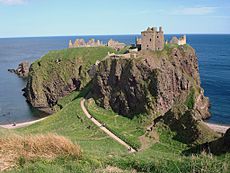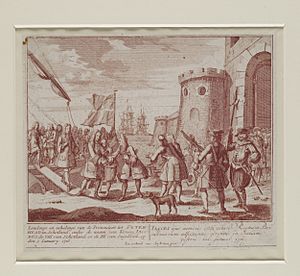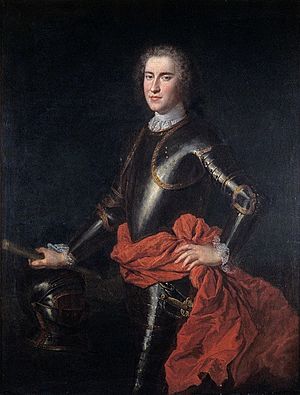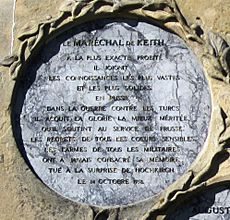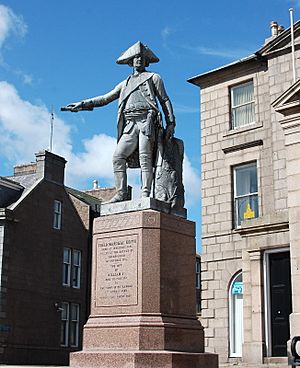James Francis Edward Keith facts for kids
Quick facts for kids
James Keith
|
|
|---|---|
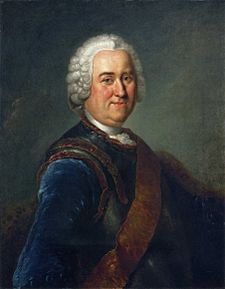 |
|
| Born | 11 June 1696 Inverugie, Kingdom of Scotland |
| Died | 14 October 1758 (aged 62) Hochkirch, Electorate of Saxony |
| Allegiance | |
| Branch | Royal Prussian Army |
| Rank | Generalfeldmarschall |
| Wars | |
| Awards |
|
| Alma mater | University of Edinburgh University of Aberdeen |
| Relations |
|
James Francis Edward Keith (also known as Jakob von Keith; born June 11, 1696 – died October 14, 1758) was a Scottish soldier. He became a very high-ranking general, called a Generalfeldmarschall, in the Royal Prussian Army.
As a Jacobite, he took part in a failed attempt to bring the old Stuart Monarchy back to the throne of Britain. When this plan failed, he had to leave Scotland. He moved to Europe, living first in France, then in Spain. He later joined the Spanish army and then the Russian army. He fought in the Anglo-Spanish War and the Russo-Swedish War. In the Russian war, he helped conquer Finland and became its temporary leader. He also helped Elizabeth of Russia become empress.
Later, he served in the Prussian army under Frederick the Great. He was a brave and skilled leader in many battles. He died during the Seven Years' War at the Battle of Hochkirch. He received important awards like the Black Eagle Order. A statue of him is on the Equestrian statue of Frederick the Great.
Contents
Early Life and Education
James Keith was born on June 11, 1696, at Inverugie Castle in Scotland. He was the second son of Mary Drummond and William Keith. His father was a Scottish nobleman and a member of the King's special council. His mother, Mary Drummond, also came from a noble family.
His parents supported the Jacobite cause, which meant they wanted the Stuart family to be kings of Scotland again. They named James after the Stuart prince, James Francis Edward Stuart. James and his older brother, George, were taught by a relative who was a historian. James studied briefly at the University of Aberdeen and then at the University of Edinburgh to become a lawyer. James Keith was also a member of the freemasons.
Fighting for the Jacobites
James Keith was unhappy with how Scotland was being ruled. He believed that Queen Anne should have chosen her brother James as the next king. Instead, a German family was chosen, which made many Scots upset. In 1715, James and his brother helped declare James Stuart as the rightful King of Scotland.
He was at the Battle of Sheriffmuir in November 1715. The Jacobite forces did not join up with other supporters, and James realized their effort was failing. The Stuart prince, James, arrived in Scotland later that year, but he came on a small fishing boat, not with a large army. This made the Jacobites lose hope. Government forces chased them, and James Keith, along with about 100 officers, escaped to France on a French warship. Because of his actions, he could not return to Great Britain.
James went to Paris, where he had relatives. He struggled financially for a while, selling his belongings. Eventually, he received money from Mary of Modena, the Stuart prince's mother, and some support from home. This allowed him to study at the University of Paris. In 1717, he was made a colonel and was told to prepare to go back to Scotland. However, this plan was discovered and stopped. Later that year, he met Peter I of Russia, the Tsar, and offered to serve him.
The 1719 Uprising
James Keith traveled to Spain with his brother. They had to hide their true purpose from customs officers because Spain was involved in a war. They went to Madrid to raise money and arrange for an army to go to Scotland. James carried important messages and money for the Jacobite cause. He even pretended to be a servant to get horses in France.
While talking with Jacobite supporters, James saw that they were divided. Everyone wanted him to tell the Stuart prince different things, which often conflicted. James felt these people cared more about their own goals than the king's. In March, the Jacobites sailed for Scotland. News of their plan had already reached London, and the government was ready.
The Jacobite efforts faced more problems. A storm scattered the Spanish fleet that was supposed to bring more soldiers. The Jacobites in Scotland were poorly armed and didn't have enough supplies. Government forces were close by. The local clans managed to gather about 1,000 more troops. On June 10, the government forces attacked at the Battle of Glen Shiel. The small Jacobite army was defeated. The Jacobites decided to scatter, and the Spanish soldiers surrendered.
James Keith hid in the mountains for several months. In September, he sailed to Holland. When trying to cross France to reach Spain, he and his brother were arrested. James had important papers from the King of Spain, which could cause trouble. Luckily, his jailers did not search him. He secretly got rid of the papers.
Service in Spain and Russia
After leaving France, James Keith joined the Spanish army as a colonel. He fought in the Siege of Gibraltar, which was not successful. He found that being a Protestant made it hard to get promoted in Catholic Spain. So, he got a recommendation from the King of Spain to serve Peter II of Russia.
In Russia, Keith was given command of two army regiments. He asked for three months to learn the Russian language and customs. He used this time to learn the language and understand the politics of the Russian court. He also became a leading Freemason in Russia. He helped Elizabeth of Russia take power in Petersburg. He received the important Imperial Order of St Andrew.
During the Russo-Swedish War of 1741–1743, James Keith was briefly the temporary leader of Finland. He was in charge of the Russian forces occupying the country. He was a good and fair administrator.
Serving Prussia
The Seven Years' War
During the Seven Years' War, Keith was a very important commander in the Prussian army. In 1756, he led troops during the Siege of Pirna and showed great skill at the Battle of Lobositz. This battle was very difficult. King Frederick of Prussia underestimated the Austrian army and sent his soldiers into a valley where they were attacked by sharpshooters.
Frederick thought the battle was lost and left the field. Command then went to Keith. At first, Keith struggled against the Austrian troops. But when the Austrian commander was wounded, Keith was able to push back the Austrian lines. The main Austrian general had not planned for a major battle, so he pulled his forces back.
In 1757, Keith commanded troops at the siege of Prague. Later in the same war, he defended the city of Leipzig against a much larger enemy force. He was also present at the Battle of Rossbach. While King Frederick was fighting at Leuthen, Keith joined forces with Prince Henry in Saxony.
Death at Hochkirch
In 1758, Keith played a big part in the campaign in Moravia. After this, he left the army for a short time to recover his health. He returned for the autumn campaign and was killed on October 14, 1758, at the battle of Hochkirch. He was shot several times. The last shot knocked him off his horse. His servant tried to help him but was dragged away, leaving Keith's body behind.
When the Austrians found his body the next day, it had been stripped of his belongings. However, he was recognized by Lacy, the son of Peter Lacy, Keith's old commander in Russia. The Austrians gave him a proper burial on the battlefield. His servant, who had returned, saw this and marked the spot. Later, King Frederick had Keith's body moved to the garrison church in Berlin.
Keith and King Frederick
While at the University of Edinburgh, James Keith developed a love for books and learning. This made him respected by many smart people in Europe. His experiences in the Jacobite uprisings taught him about leadership, how to negotiate, and how important it is to listen. He learned even more about tricky court politics during his 17 years in Russia. In his military campaigns, he showed calm, smart, and watchful bravery.
In his personal life, he was known for being calm and loyal. This was different from his father, who was described as "wild" and "inconstant." In Finland, he met Eva Merthen. They had several children together, though they never married.
Keith became one of King Frederick's closest allies and friends. Keith even invented a life-sized chess game that he and Frederick would play. Frederick also traveled secretly with Keith across Germany and Hungary.
Frederick was very sad when Keith died at Hochkirch. Keith had once told the king, "If the Austrians leave us alone in this camp, they deserve to be hanged." Frederick reportedly replied, "It is to be hoped they are more afraid of us than of the gallows."
Memorials and Legacy
Many memorials were built for James Keith by King Frederick, Prince Henry, and others. He was remembered in a song called "Fridericus Rex" by Willibald Alexis, which became part of a famous march. He is also honored on the Equestrian statue of Frederick the Great (built in 1851). In 1889, a German infantry regiment was named after him. The town of Hochkirch, where he died, has a stone tablet outside its church dedicated to Keith. There is also a statue of Keith in Peterhead, Scotland. This statue was given to the town by William I, King of Prussia, in 1868.
 | Delilah Pierce |
 | Gordon Parks |
 | Augusta Savage |
 | Charles Ethan Porter |


